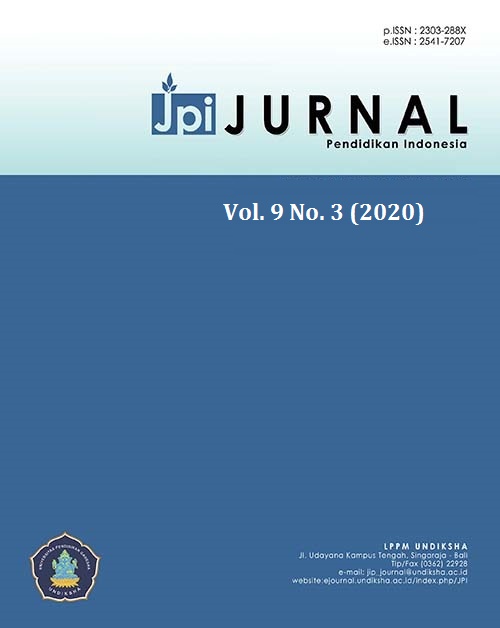The Contribution of Principal's Leadership Style, Teacher Competence, and School Climate Toward Students’ Learning Outcomes
DOI:
https://doi.org/10.23887/jpi-undiksha.v9i3.24409Abstract
This study aims to analyze the contribution of principal leadership style, teacher competence, and school climates to the quality of learning outcomes. This study was a quantitative method. Data collection was carried out using a questionnaire and analyzed by multiple linear regression. The results of this study are the relationship between the principal's leadership style and the school climate has t-count 7.15>t-table 1.96; the relationship between teacher competence and school climates has a value of t-count 3.66>t-table 1.96; the relationship between the principal's leadership style and the quality of learning outcomes has t-count 8.13>t-table 1.96; the relationship of teacher competence with the quality of learning outcomes has t-count 5.47>t-table 1.96; the relationship of school climate with the quality of learning outcomes has a t-count value of 5.64>t-table 1.96; the relationship between the principal's leadership style through the school climate with the quality of learning outcomes has a value of t-count 4.43>t-table 1.96; the relationship between teacher competence through school climate and the quality of learning outcomes has t-count 3.07>t-table 1.96.
References
Aguswara, W. W., & Rachmadtullah, R. (2017). Pengaruh Gaya Kepemimpinan Kepala Sekolah Dan Iklim Organisasi Dengan Kinerja Guru Pendidikan Anak Usia Dini. JPUD - Jurnal Pendidikan Usia Dini, 11(2), 369–385. https://doi.org/10.21009/jpud.112.14
Aprilda. (2012). Pengaruh Kompetensi Terhadap Prestasi Kerja Pegawai ( Studi pada Bagian Pengelolaan Keuangan Balai Pengembangan Pendidikan Nonformal dan Informal Regional I Medan ) Pemerintah Provinsi Sumatera Utara. Jurnal Administrasi Publik, 3(2), 181–206. https://doi.org/10.31289/jap.v2i2.1371
Arifin, R. B. M., Teh, K. S. Bin, Muhamad, N., & Amrullah. (2018). Pemikiran Ibnu Khaldun dalam Strategi Pelaksanaan Iklim Dini Di Sekolah. Pedagogia : Jurnal Pendidikan, 7(2), 137–144. https://doi.org/10.21070/pedagogia.v6i1
Arsil, A., Yantoro, Y., & Sari, R. (2018). Analisis Iklim Sekolah dalam Mendukung Proses Pembelajaran di Sekolah Dasar. Journal of Inherited Metabolic Disease, 3(1), 39–56. https://doi.org/10.22437/gentala.v3i1.6753
Aryani, W. D. (2014). Peningkatan keaktifan dan hasil belajar IPS melalui PAKEM dengan bantuan media pada siswa kelas VIIIA SMP Negeri 1 Kandeman Batang tahun pelajaran 2013/2014. Jurnal Forum Ilmu Sosial, 41(1), 103–124. https://doi.org/10.15294/fis.v41i1.5397
Creswell, J. W. (2008). Research Design, Pendekatan Kualitatif, Kuantitatif, dan Mixed, Edisi Ketiga. Bandung: Pustaka Pelajar.
Djafar, H. (2017). Model Kepemimpinan Dalam Pembinaan Karakter Peserta Didik Di Smk Negeri Labuang Kabupaten Polewali Mandar. Idaarah: Jurnal Manajemen Pendidikan, 1(2), 191–199. https://doi.org/10.24252/idaarah.v1i2.4263
Djafri, N. (2015). Pengaruh Gaya Kepemimpinan, Empati Dan Motivasi Terhadap Budaya Organisasi (Studi Kasus Terhadap Kepala Sekolah Dasar Kota Gorontalo). Jurnal Manajemen, 19(1). https://doi.org/http://dx.doi.org/10.24912/jm.v19i1.105
Hakim, H., & Sarbiran, S. (2004). Iklim Belajar dan Iklim Praktik serta Produktivitas Belajar ditinjau dari Aspek Kepemimpinan Kepala Sekolah dalam Konteks Pendidikan Sistem Ganda. In Jurnal Penelitian dan Evaluasi Pendidikan (Vol. 3, Issue 4). https://doi.org/10.21831/pep.v3i4.2080
Hapsari, O., Hariyadi, S., & Prihastuty, R. (2014). Pengatuj. Intuisi. (JURNAL ILMIAH PSIKOLOGI), 6(1). https://doi.org/10.15294/intuisi.v6i1.11913
Lestari, I. (2018). Penerapan Metode Pembelajaran Diskusi Dan Resitasi Dalam Meningkatkan Hasil Belajar Pendidikan Agama Hindu Siswa Kelas Iv Sd Negeri 2 Tumbu Karangasem. Jurnal Penjaminan Mutu, 4.
Mas, S. (2012). Hubungan Kompetensi Personal Dan Profesional Guru Dengan Motivasi Belajar Siswa Di SMKN 2 Kota Gorontalo. Jurnal Pendidikan Dan Pembelajaran (JPP), 19(2), 212–219.
Muhani, M., Imron, A., & Kusmintardjo, K. (2016). Kepemimpinan Kepala Sekolah Dasar Di Daerah Terpencil (Studi Multi Kasus Di Sdn 2 Bakalan Dan Sdn 2 Kepyar Purwantoro Kabupaten Wonogiri). Jurnal Pendidikan: Teori, Penelitian, Dan Pengembangan, 1(8), 1464–1472. https://doi.org/10.17977/JP.V1I8.6616
Nini, A. (2017). Pembinaan Iklim Sekolah K-7 Sebagai Upaya Meningkatkan Efektivitas Belajar: Best Practices. Cendekia: Jurnal Kependidikan Dan Kemasyarakatan, 13(2), 133–140. https://doi.org/10.30957/cendekia.v13i2.601
Purwanti, K., AR, M., & Yusrizal, Y. (2014). Kepemimpinan Kepala Sekolah Dalam Meningkatkan Kompetensi Guru Pada Smp Negeri 2 Simeulue Timur. Jurnal Ilmiah Didaktika, 14(2), 390–400. https://doi.org/10.22373/jid.v14i2.510
Ramadoni, W., & Arifin, I. (2016). Kepemimpinan Kepala Sekolah Dalam Upaya Peningkatan Kinerja Guru (Studi Multi Kasus Di Paud Islam Sabilillah Dan Sdn Tanjungsari 1 Kabupaten Sidoarjo). 1500–1504.
Shobron, S., & Suyanto, S. (2016). Kinerja Guru Bersertifikasi Dalam Meningkatkan Manajemen Mutu Pendidikan Di Madrasah Ibtidaiyah Muhammadiyah Sudung Kedungtuban Blora Tahun 2015. Profetika: Jurnal Studi Islam, 17(01), 57–67. https://doi.org/10.23917/profetika.v17i01.2100
Sugiyono. (2013). Metode Penelitian Kuantitatif, Kualitatif dan R&D. Bandung: Alfabeta.CV.
Suhendro, H. (2012). Iklim Organisasi Sekolah, Kecerdasan Emosional Guru, Dan Pengetahuan Teknologi Informasi Dengan Profesionalisme Guru Smk. Teknologi Kejuruan, 32(1).
Sukiyanto, & Maulidah, T. (2020). Pengaruh Gaya Kepemimpinan Kepala Sekolah dan Budaya Organisasi terhadap Motivasi Guru dan Karyawan. Jurnal Pendidikan Edutama, 7(1), 127. https://doi.org/10.30734/jpe.v7i1.874
Sumantri, R. F. (2012). Kompetensi Pengelolaan Pembelajaran, Kecerdasan Interpersonal, Komitmen, Dan Kepuasan Kerja Guru SMK. Jurnal Ilmu Pendidikan, 18(1), 30–35.
Winarsih, S. (2018). Gaya Kepemimpinan Kepala Sekolah dalam Meningkatkan Kinerja Guru. International Conference of Moslem Society, 2, 95–106. https://doi.org/10.24090/icms.2018.1864
Yudiaatmaja, F. (2017). Kepemimpinan: konsep, teori dan karakternya. Media Komunikasi FPIPS, 12(2). http://dx.doi.org/10.23887/mkfis.v12i2.1681
Downloads
Published
Issue
Section
License
Authors who publish with the Jurnal Pendidikan Indnesia agree to the following terms:
- Authors retain copyright and grant the journal the right of first publication with the work simultaneously licensed under a Creative Commons Attribution License (CC BY-SA 4.0) that allows others to share the work with an acknowledgment of the work's authorship and initial publication in this journal.
- Authors are able to enter into separate, additional contractual arrangements for the non-exclusive distribution of the journal's published version of the work (e.g., post it to an institutional repository or publish it in a book), with an acknowledgment of its initial publication in this journal.
- Authors are permitted and encouraged to post their work online (e.g., in institutional repositories or on their website) prior to and during the submission process, as it can lead to productive exchanges, as well as earlier and greater citation of published work. (See The Effect of Open Access)








